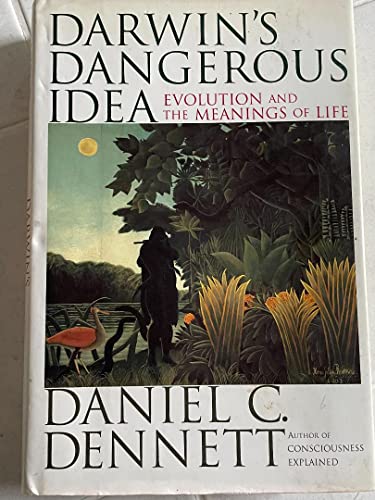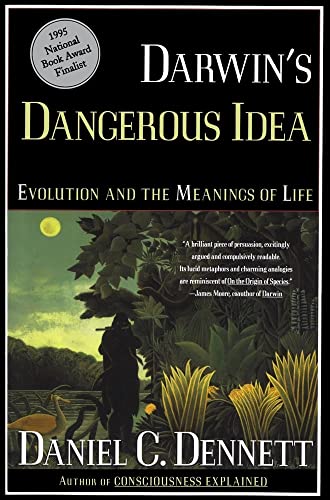Darwin's Dangerous Idea Evolution and the Meanings of Life by Dennett Daniel C, First Edition (4 results)
FeedbackSearch filters
Product Type
- All Product Types
- Books (4)
- Magazines & Periodicals (No further results match this refinement)
- Comics (No further results match this refinement)
- Sheet Music (No further results match this refinement)
- Art, Prints & Posters (No further results match this refinement)
- Photographs (No further results match this refinement)
- Maps (No further results match this refinement)
- Manuscripts & Paper Collectibles (No further results match this refinement)
Condition
Binding
Collectible Attributes
- First Edition (4)
- Signed (No further results match this refinement)
- Dust Jacket (1)
- Seller-Supplied Images (No further results match this refinement)
- Not Print on Demand (4)
Language (2)
Free Shipping
- Free Shipping to United Kingdom (No further results match this refinement)
Seller Location
Seller Rating
-
Darwin's Dangerous Idea: Evolution and the Meanings of Life (Penguin Science)
Seller: Kennys Bookshop and Art Galleries Ltd., Galway, GY, Ireland
First Edition
£ 15.31
Convert currency£ 2.60 shipping from Ireland to United KingdomQuantity: Over 20 available
Add to basketCondition: New. 1996. 1st Edition. paperback. Argues that the theory of evolution can demystify the miracles of life without devaluing our most cherished beliefs. In this book, the author explores every aspect of evolutionary thinking to show why it is so fundamental to our existence, and why it affirms - not threatens - our convictions about the meaning of life. Num Pages: 592 pages, bibliography, index. BIC Classification: PDA; PSAJ. Category: (G) General (US: Trade). Dimension: 197 x 130 x 26. Weight in Grams: 408. . . . . .
-
Darwin's Dangerous Idea; Evolution and the Meanings of Life
Published by Simon and Schuster, New York, 1995
ISBN 10: 0684802902 ISBN 13: 9780684802909
Language: English
Seller: Ground Zero Books, Ltd., Silver Spring, MD, U.S.A.
First Edition
£ 30.76
Convert currency£ 22.40 shipping from U.S.A. to United KingdomQuantity: 1 available
Add to basketHardcover. Condition: Very good. Dust Jacket Condition: Very good. 586, [6] pages. Bibliography. Index. Daniel Clement Dennett III (born March 28, 1942) is an American philosopher, writer, and cognitive scientist whose research centers on the philosophy of mind, philosophy of science, and philosophy of biology, particularly as those fields relate to evolutionary biology and cognitive science. As of 2017 he is the co-director of the Center for Cognitive Studies and the Austin B. Fletcher Professor of Philosophy at Tufts University. Dennett is an atheist and secularist, a member of the Secular Coalition for America advisory board, and a member of the Committee for Skeptical Inquiry, as well as an outspoken supporter of the Brights movement. Dennett is referred to as one of the "Four Horsemen of New Atheism", along with Richard Dawkins, Sam Harris, and the late Christopher Hitchens. Dennett is a member of the editorial board for The Rutherford Journal. Darwin's Dangerous Idea: Evolution and the Meanings of Life is a 1995 book by Daniel Dennett, in which Dennett looks at some of the repercussions of Darwinian theory. The crux of the argument is that, whether or not Darwin's theories are overturned, there is no going back from the dangerous idea that design (purpose or what something is for) might not need a designer. Dennett makes this case on the basis that natural selection is a blind process, which is nevertheless sufficiently powerful to explain the evolution of life. Darwin's discovery was that the generation of life worked algorithmically, that processes behind it work in such a way that given these processes the results that they tend toward must be so. Dennett says, for example, that by claiming that minds cannot be reduced to purely algorithmic processes, many of his eminent contemporaries are claiming that miracles can occur. These assertions have generated a great deal of debate and discussion in the general public. The book was a finalist for the 1995 National Book Award in non-fiction and the 1996 Pulitzer Prize for General Non-Fiction. Darwin's Dangerous Idea is not meant to be a work of science, but rather an interdisciplinary book; Dennett admits that he does not understand all of the scientific details himself. He goes into a moderate level of detail, but leaves it for the reader to go into greater depth if desired, providing references to this end. In writing the book, Dennett wanted to "get thinkers in other disciplines to take evolutionary theory seriously, to show them how they have been underestimating it, and to show them why they have been listening to the wrong sirens." To do this he tells a story; one that is mainly original but includes some material from his previous work. Presumed First Edition, First printing [stated].
-
Darwin's Dangerous Idea : Evolution and the Meanings of Life
Published by Simon and Schuster, New York, New York, U.S.A., 1996
ISBN 10: 068482471X ISBN 13: 9780684824710
Language: English
Seller: M. W. Cramer Rare and Out Of Print Books, Toronto, ON, Canada
First Edition
£ 7.69
Convert currency£ 44.80 shipping from Canada to United KingdomQuantity: 1 available
Add to basketTrade Paperback. Condition: Fine. First Edition, Thirteenth Printing.
-
£ 43.74
Convert currency£ 15.77 shipping from Belgium to United KingdomQuantity: 1 available
Add to basketLondon, Allen Lane, Penguin Press, 1995, first English edition, in-8°, 586 pp, index, bibliography, hardback, nice copy.





